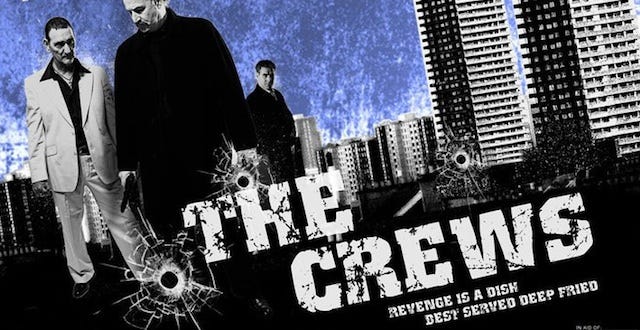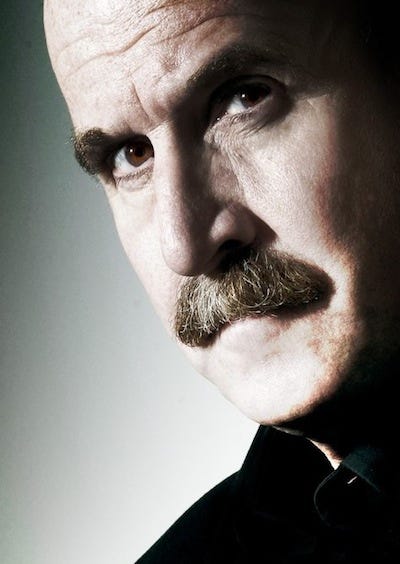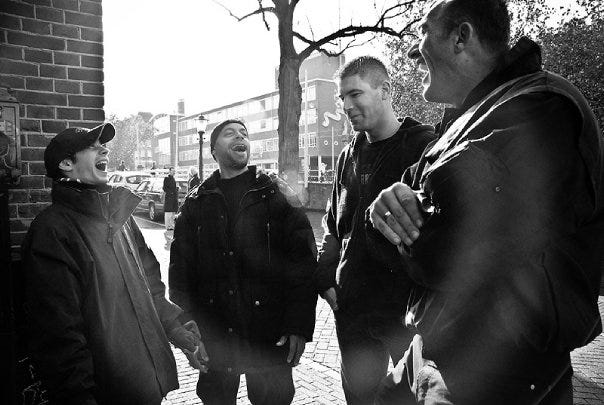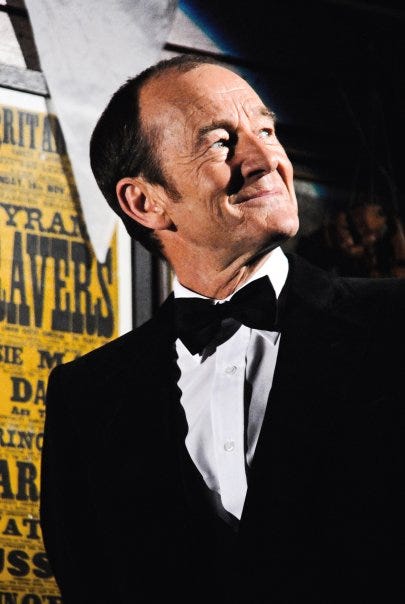'I wanted a complex story with an ensemble cast': Colin Ross Smith on The Crews

What do you get when you mix Goodfellas with The Wire, add a dash of The Sopranos and set it in Glasgow?
Focusing on the heads of two criminal families, Tommy Granger (Robert Harrison) and Mick Turner (Jim Sweeney), The Crews began life as a potential TV pilot before becoming a multi-episode, web-only, series.
With the final episode soon to be released online, The Crews co-creator Colin Ross Smith explains how the series developed from a short film, how a TV pilot can be made without funding and the future of Scotland's latest crime drama.
Jonathan Melville: What's your background in TV or film production?
Colin Ross Smith: I went to Cardonald College and did a course in TV production, but I wasn’t really good at the studying side of things and I left the course, continuing to try and find a way in to the TV or film industry. All of my film efforts had been self-funded short films before The Crews.
How did Sandwich, the prequel to The Crews, come about?

Sandwich came about in discussion with Robert Harrison. He asked me to help edit his show reel, but I thought it needed some more scenes as it didn’t have a lot of films under his belt that showed his range. So I suggested we film something.
Not long after I was watching Goodfellas and there were some bits that got me thinking. The main gangster stayed in quite a nice house, and although he had lots of criminal stuff going on there were also homely activities happening. I thought to myself, for all I know a gangster lives down the street from me as we stay in quite a nice bit of town. So during the interval I went up stairs to make a sandwich and started improvising the scene which became part of the first act. I took it from there and started writing the first few pages on a piece of paper.
What was the casting process?
For Sandwich I wrote some parts with some people in mind. I wrote a part for my friend's daughter who was interested in drama. The main part was of course written with Robert Harrison in mind. The characters of John Drummond and Stevie Turner were casting suggestions from Robert Harrison. I cast Chris Somerville from having seen him in a clip from a feature film Pondlife, which was directed by Sean Wilkie.
I had also written a part for a friend of mine, but he had to pull out so we got suggested Scott Kyle by Sean Wilkie. So the casting process wasn’t really held via auditions. It was mainly via writing a part for someone in mind or just approaching actors we liked. I had young Rebekah and Chris read for their roles, but it was really a confirmation then an audition.
When did you decide that you wanted to do more with the characters from Sandwich?
It was actually Kolin Ferguson who helped on Sandwich who suggested you could use the characters as a launch pad for a potential series. After we had finished a pretty polished version of Sandwich we decided to move forward and we expanded the universe of Sandwich. Initially we were going to make the whole series, but we were advised to just make the first episode as a pitching tool.
What was the writing process? Did you plan outlines for future episodes?

We had outlines for the first series of episodes, but only got the chance to make the first part of The Crews, which was split up into smaller webisodes. I think they have turned out quite well. I wanted the show to be a complex story with an ensemble cast, much like some of my favourite shows like Battlestar Galactica and Lost. I like the fact they have a lot of characters to draw on as you’re not stuck with a small, five strong cast.
Did you pitch the idea of The Crews to any TV channels before shooting it?
We did not pitch before filming. I guess because we had no track record we wanted to pitch by making our first episode ourselves. Hopefully the product we did would have been good enough to persuade broadcasters to take a jab at it. Initially we wanted to make all the episodes ourselves and have a finished product we could sell to broadcasters.
How did you raise the money to pay the cast and crew?
The project was not an employment situation. It was not fully funded by any organisation so it was an amateur project. All work was done in kind with the hopes that because we were pitching for a long running series if it took off it would be the possibility of more work down the line for cast and crew involved. The Crews could only be made because people put in their time for free.
We had companies donate services, locations for free as they saw the same potential in the project. Had we had to employ people to work on the projects the costs would have ballooned and it would have been unachievable. For example, the cast and crew who travelled to Amsterdam paid out of their own pockets to go travel there. Mischa Van Der Klei paid money out of his own pocket to return the favour and visit Scotland to film his scenes.
We had music supplied by Paul Leonard Morgan, the in-house composer of Spooks, as his company saw potential in what we were doing. We also had a post production facility help us get a sound mix done in the hopes that getting the project off the ground would lead to more work. It was amazing to see what help was out there when we looked for it. I am so grateful for all that was supplied and my only regret is that the show did not get picked up so that we might repay everyone involved.
Where and when did filming take place?
Filming took place in Glasgow, Amsterdam, and in the University of the West of Scotland (UWS) building in Ayrshire, as well as a forest in Greenock. Filming took place from august 2008 to November 2009. It then took another year in post to finish and we had our cast and crew screening in june of 2010 and our Cineworld premiere in August 2010.
We then spent the next year going from the process of trying to get broadcasters on board to then looking at moving on to the web series, which meant the episodes had to be re-edited down into smaller episodes. We finally launched the series online last month.

You mentioned that you filmed at the UWS, did they help with the production in any other way?
UWS helped us by providing their building as a location. The University was used as a police station, hospital and the interior of a Secondary school. We also cast many of their students former and current in roles within the film. The casting wasn’t favouritism in any way though as the University has a great range of actors and some of them were able to win various parts in the show. Stuart Hepburn who lectures at the University played a pivotal role in the crews as DCS Watt.
At what point did it change from a TV episode to a series of webisodes?
When it seemed TV broadcasters were not keen on the show we decided to try our luck online. If The Crews can be a success online perhaps it would persuade TV networks to look at the project differently. Although the show hasn’t gone viral quite yet, it is doing well. We manage to rack up a good couple of hundred views on the first day of release, and then the viewership levels off and builds at a steady pace. At the end of the day if nothing comes of the project it is better it be out in the world to be seen than stuck in a drawer. Who knows, it may build a steady fan base over time.
Did you have to re-edit substantially for the new format? Did anything change as a result?
We had to cut the episodes into shorter 16-18 minute episodes. We had a lot going on in the show, in hindsight maybe too much, but I think splitting the episodes into smaller chunks make it easier for the audience to take in what is happening.
With shows like this it really does take time to really develop. It took me a while to get into The Wire and even Battlestar Galactica as there seemed to be a lot going on. But once you were invested in it you really enjoyed it. When you go back and watch the episodes again you get a lot more out of it. I’d hope this would happen with The Crews; that people repeat their viewings and pick up on some detail that wasn’t caught on the first viewing.
Do you think you can make money from this format or is it purely a way to release it to the world?
I think in order to make money you really need to have a big audience. I am sure there are manys to profit online, but at the moment we are more interested in releasing the series so that people can see it and raise awareness of it.
How did you secure David Hayman and Stephen McCole for roles?

David Hayman was given a copy of the script and Sandwich. We asked him if he would like to play a part in the opening episode and he kindly said yes. Stephen was also offered a part in the same way. We had sent him the script and he liked the look of it so was able to help us out.
How has the process of making and distributing The Crews left you feeling about the industry?
Well I'm just starting out so I really can’t feel anything but gratitude that I was able to have the opportunity to work with such amazing people. Even though we no interest from broadcasters we all did learn something. Although the BBC were not interested they were very good at offering feedback and I had the opportunity to talk with one of the executive producers from drama at the BBC so that was very helpful indeed.
However as far as the industry goes I am still outside looking in. Hopefully I’ll be in it at some point. I want to be. I don’t want to be stuck on the outside all the time. I don’t think it would be right to have a negative feeling about the industry just because one project wasn’t able to capture the interest of the powers that be. I think it would be unhealthy to feel jaded and give up. All roads lead to Rome, just sometimes you come up against a dead end and have to turn back and try a different one.
Looking back, is there anything you would have done differently?
If you could travel back in time then yes, but we cannot. However it was important to do The Crews as I learned a lot from doing it. All of our efforts in life are moments to learn, our failures teach us even more than our success do. The Crews was like a film school for me in some ways. All you can do is look to the next project, apply what you learned and see if you can do the next project any differently.
Since The Crews finished I’ve been working on some short films as they are a lot easier in terms of scope to finish as they are much shorter. I have been trying to apply what I learned from The Crews in the short films I have done. And I will then apply what I learn on those films to the next one.
What are your hopes for The Crews after series one ends?
It would be great if someone, a broadcaster or established production company looked at it and thought it was worth investing in. However, if at the end of the day the cast and crew involved can get recognition out of it then that will be the best reward we can get.
I’d love to continue The Crews, but as it stands it’s a project that is probably too big in scope to continue in the same manner it took us to make the first episodes. Although I believe we can make The Crews at a cost much lower than what most dramas cost, I think that cost would still be too much for the likes of amateur filmmakers. When I say amateur I only mean by the definition of not being paid to do something. Although it was made at an amateur level I believe the standards were as good as what professionals can achieve.
It was a project that was quite risky, but we took the chance we could produce something of a quality that would appeal to broadcasters. The real hope we have is if the show was to somehow spread throughout the country and pick up views and good ratings.
If you are able to draw in a massive amount of viewers than you have something in your hands that might make TV broadcasters change their mind.
Tomorrow we'll be publishing an exclusive commentary from Colin Ross Smith to accompany each epsiode of The Crews, plus a brand new clip from episode six.
In the meantime, watch episode one of The Crews: The Dutch Connection on YouTube.
Follow The Crews on Facebook and Twitter.



